Unit 1 Where did you go on vacation? Section A 单词讲解课件+嵌入音频
文档属性
| 名称 | Unit 1 Where did you go on vacation? Section A 单词讲解课件+嵌入音频 |  | |
| 格式 | pptx | ||
| 文件大小 | 2.6MB | ||
| 资源类型 | 试卷 | ||
| 版本资源 | 人教新目标(Go for it)版 | ||
| 科目 | 英语 | ||
| 更新时间 | 2022-07-18 16:42:24 | ||
图片预览

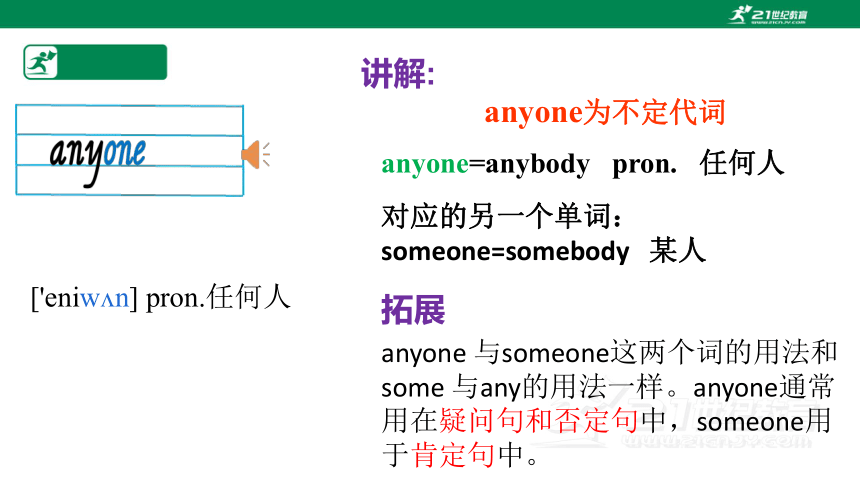
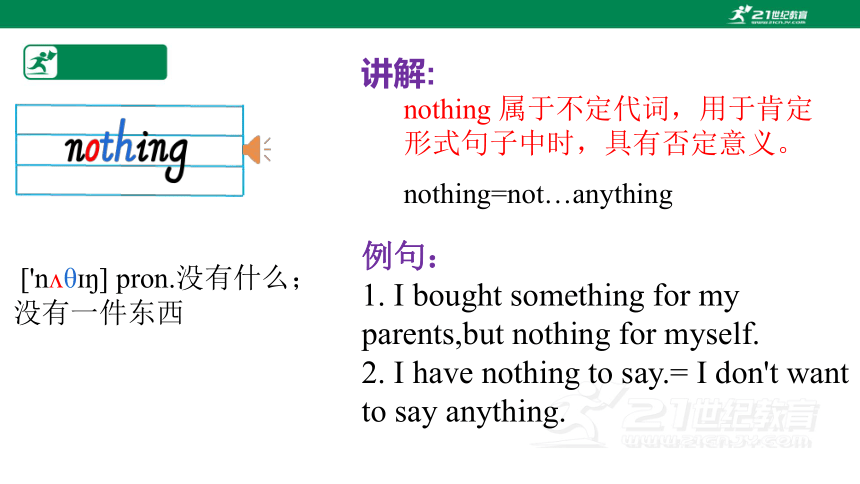
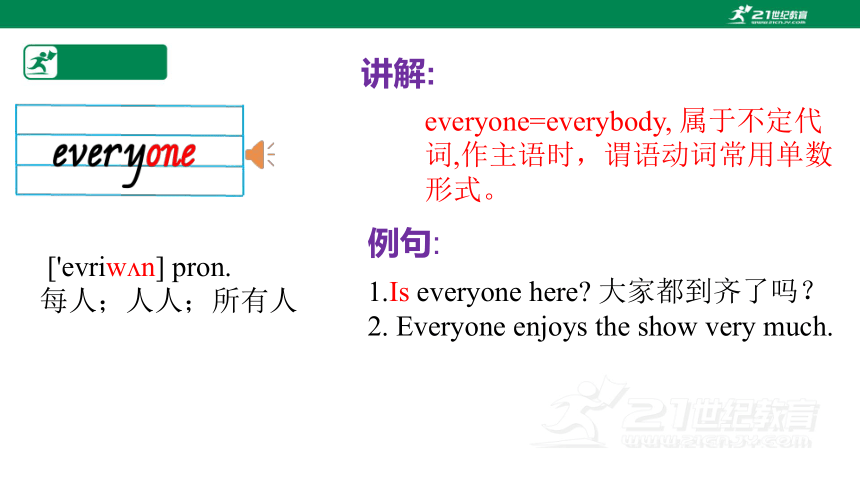
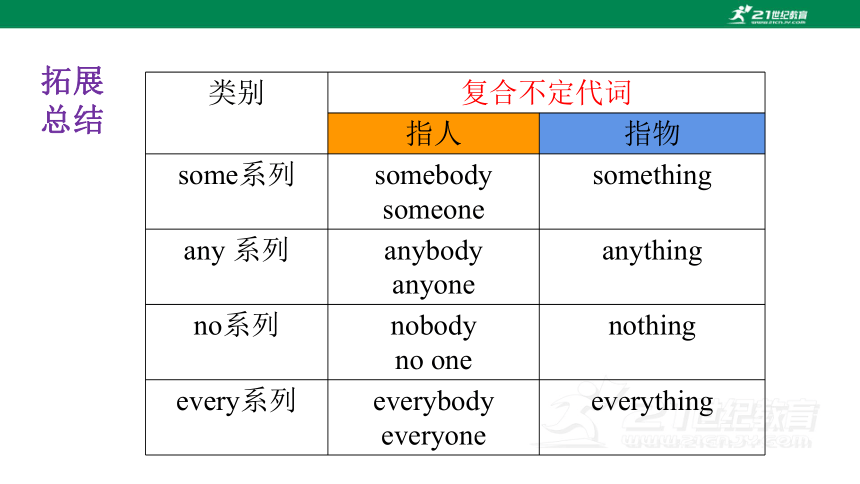
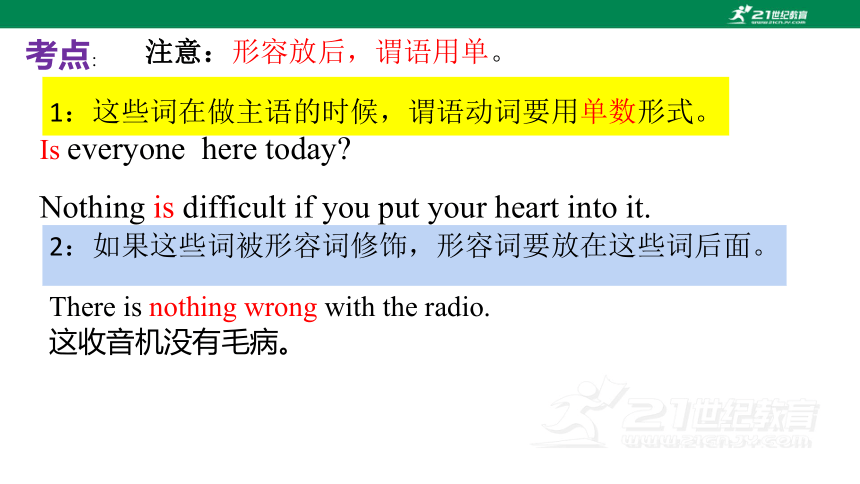

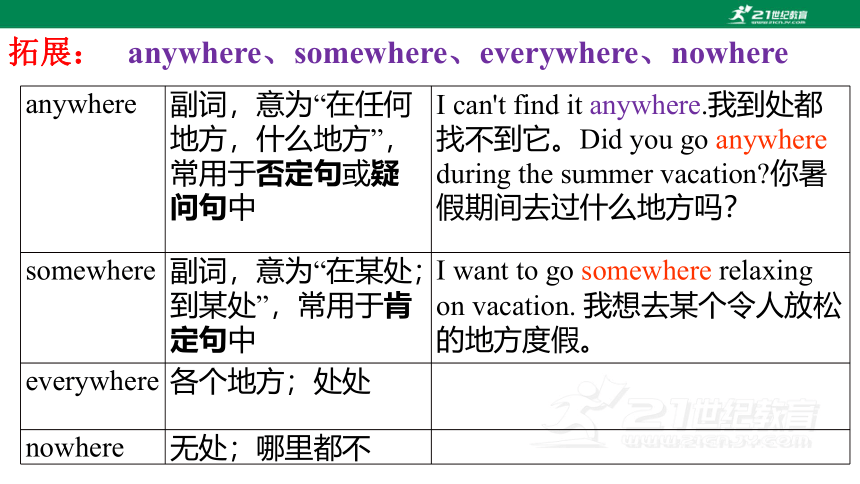
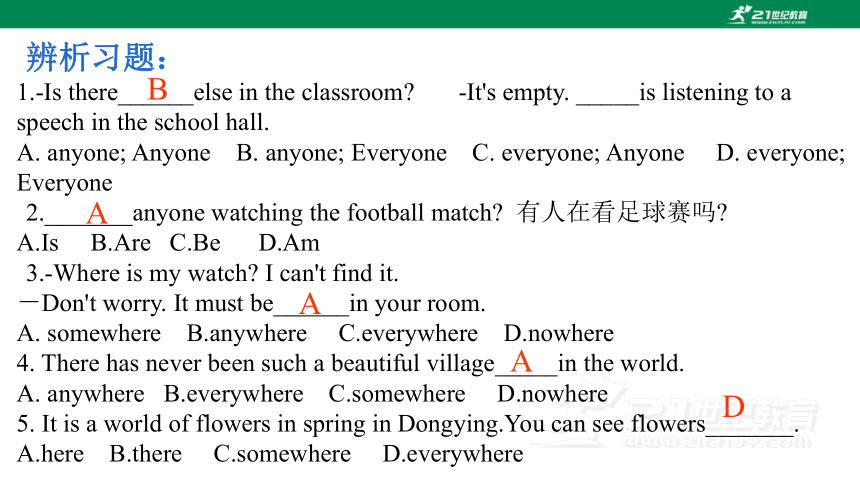
文档简介
(共28张PPT)
Unit1 Where did you go on vacation
SectionA 单词讲解
['eniw n] pron.任何人
拓展
anyone=anybody pron. 任何人
对应的另一个单词:someone=somebody 某人
anyone 与someone这两个词的用法和some 与any的用法一样。anyone通常用在疑问句和否定句中,someone用于肯定句中。
anyone为不定代词
['n θ ] pron.没有什么;
没有一件东西
nothing=not…anything
nothing 属于不定代词,用于肯定形式句子中时,具有否定意义。
例句:
1. I bought something for my parents,but nothing for myself.
2. I have nothing to say.= I don't want to say anything.
['evriw n] pron.
每人;人人;所有人
everyone=everybody, 属于不定代词,作主语时,谓语动词常用单数形式。
1.Is everyone here 大家都到齐了吗?2. Everyone enjoys the show very much.
例句:
类别 复合不定代词 指人 指物
some系列 somebody someone something
any 系列 anybody anyone anything
no系列 nobody no one nothing
every系列 everybody everyone everything
拓展
总结
考点:
Is everyone here today
Nothing is difficult if you put your heart into it.
1:这些词在做主语的时候,谓语动词要用单数形式。
2:如果这些词被形容词修饰,形容词要放在这些词后面。
There is nothing wrong with the radio.
这收音机没有毛病。
注意:形容放后,谓语用单。
['eniwe ] adv.任何地方
anywhere为不定副词
拓展:
somewhere某地;
everywhere 到处,每个地方
短语:
somewhere intersting
find it everywhere
anywhere 副词,意为“在任何地方,什么地方”,常用于否定句或疑问句中 I can't find it anywhere.我到处都找不到它。Did you go anywhere during the summer vacation 你暑假期间去过什么地方吗?
somewhere 副词,意为“在某处;到某处”,常用于肯定句中 I want to go somewhere relaxing on vacation. 我想去某个令人放松的地方度假。
everywhere 各个地方;处处
nowhere 无处;哪里都不
anywhere、somewhere、everywhere、nowhere
拓展:
辨析习题:
1.-Is there______else in the classroom -It's empty. _____is listening to a speech in the school hall.
A. anyone; Anyone B. anyone; Everyone C. everyone; Anyone D. everyone; Everyone
2._______anyone watching the football match 有人在看足球赛吗
A.Is B.Are C.Be D.Am
3.-Where is my watch I can't find it.
-Don't worry. It must be______in your room.
A. somewhere B.anywhere C.everywhere D.nowhere
4. There has never been such a beautiful village_____in the world.
A. anywhere B.everywhere C.somewhere D.nowhere
5. It is a world of flowers in spring in Dongying.You can see flowers_______.
A.here B.there C.somewhere D.everywhere
D
B
A
A
A
['w nd fl] adj.精彩的;绝妙的
近义词:great,excellent
构词法:wonder+ ful构成形容词
类似单词:use+ful=useful
help+ful=helpful
wonder n.奇迹,奇观
v.想知道
例句:
1.The Great Wall is one of the greatest wonders in the world,
2.I wonder what they are doing here. 我想知道他们在这里做什么
短语:
have a wonderful time
[fju:] adj. & pron. 很少;不多
拓展:
few + 可数名词复数
“几乎没有”(表示否定)
a few+可数名词复数
“有一些”(表示肯定)
little , a little, 都修饰不可数名词,little表示否定 ,
a little表示肯定
例句:
1.She is very shy, so she has few friends.
译文:她很害羞,因而她几乎没有朋友。
2.There is little milk left,let’s go and buy some.
译文:牛奶不多了,我们去买一些吧。
相当多;不少(后接可数名词)
quite a few+后接复数名词
quite a few people 很多人
[m st] adj. pron 最多的;大多数
用法:
most of the+名词=most+名词
例如:
most of the students=most students
most of the time 大多数时间
拓展:
at most至多 at least 至少
much /many -more -most
原级 比较级 最高级
['s mθ ] pron.某事;某物
something 属于不定代词
注意:
1.定语后置
something important
2,做主语谓语动词用单数
[ vk :s] 当然;自然
.of course=certainly=sure 当然
例句:
— Can you help me with the housework
— Of couse.
[ma 'self] pron.我自己;我本人 (第一人称主语 I 所对应的反身代词 )
一、二人称的反身代词
构成: 形容词性物主代词+self/selves构成
单数 myself yourself
复数 ourselves yourselves
第三人称的反身代词
构成: 第三人称宾格+self/selves
单数: himself herself itself
复数: themselves 反身代词的常见搭配:
enjoy oneself=have fun =have a good time玩得高兴
by oneself =alone 独自
introduce oneself to 自我介绍
[j :'self] pron.你自己
第二人称主语 you (你) 对应的反身代词为yourself;主语 you (你们)对应的反身代词为yourselves
例句:
You can see yourself in the mirror.
[hen] n.母鸡
可数名词,复数: hens
例句:
My grandma keeps some hens on the farm, so we don't need to buy eggs.
n.猪
可数名词,复数: pigs
例句:
Some people make a living by keeping pigs in the countryside.
[si:m] v.似乎;好像;看来
(1)Sb./sth. seem +adj. 某人/某事看起来如何
You seem very exciting today.
(2)Sb./sth. seem +n.
She seems a clever girl.
(3)Sb./sth. seem to do/to be
The math problem seems very difficult to work out.
He seems to have a cold.
(4)It seems that +句子
It seems that no one knows the person.
[b :d] adj.厌倦的;烦闷的
bored感到厌倦的 主语是人
(强调一个人的心理状况)
boring 令人感到无聊的 主语是物
(修饰事物性质,特点)
例句: I’m bored with what he said.
我对他说的话厌烦极了。
I find the story very boring.
我发现这个故事太无聊了。
拓展:
以-ed结尾的形容词作表语时,通常人作主语;
以-ing结尾的形容词作表语时,通常事物作主语。
常见的有:
interested 感兴趣的 interesting 令人感兴趣的
tired 感到疲倦的 tiring 令人疲倦的
excited 感到兴奋的 exciting 令人兴奋的
['s mw n] pron.某人
someone属于不定代词,常用于肯定句中,在句中作主语时,谓语动词用单数形式。
例句:
Someone is singing in the next room.
['da ri] n.日记;日记簿
keep a diary 记日记
复数:diaries
例句:
She likes to write down something special in her diaries.
Unit1 Where did you go on vacation
SectionA 单词讲解
['eniw n] pron.任何人
拓展
anyone=anybody pron. 任何人
对应的另一个单词:someone=somebody 某人
anyone 与someone这两个词的用法和some 与any的用法一样。anyone通常用在疑问句和否定句中,someone用于肯定句中。
anyone为不定代词
['n θ ] pron.没有什么;
没有一件东西
nothing=not…anything
nothing 属于不定代词,用于肯定形式句子中时,具有否定意义。
例句:
1. I bought something for my parents,but nothing for myself.
2. I have nothing to say.= I don't want to say anything.
['evriw n] pron.
每人;人人;所有人
everyone=everybody, 属于不定代词,作主语时,谓语动词常用单数形式。
1.Is everyone here 大家都到齐了吗?2. Everyone enjoys the show very much.
例句:
类别 复合不定代词 指人 指物
some系列 somebody someone something
any 系列 anybody anyone anything
no系列 nobody no one nothing
every系列 everybody everyone everything
拓展
总结
考点:
Is everyone here today
Nothing is difficult if you put your heart into it.
1:这些词在做主语的时候,谓语动词要用单数形式。
2:如果这些词被形容词修饰,形容词要放在这些词后面。
There is nothing wrong with the radio.
这收音机没有毛病。
注意:形容放后,谓语用单。
['eniwe ] adv.任何地方
anywhere为不定副词
拓展:
somewhere某地;
everywhere 到处,每个地方
短语:
somewhere intersting
find it everywhere
anywhere 副词,意为“在任何地方,什么地方”,常用于否定句或疑问句中 I can't find it anywhere.我到处都找不到它。Did you go anywhere during the summer vacation 你暑假期间去过什么地方吗?
somewhere 副词,意为“在某处;到某处”,常用于肯定句中 I want to go somewhere relaxing on vacation. 我想去某个令人放松的地方度假。
everywhere 各个地方;处处
nowhere 无处;哪里都不
anywhere、somewhere、everywhere、nowhere
拓展:
辨析习题:
1.-Is there______else in the classroom -It's empty. _____is listening to a speech in the school hall.
A. anyone; Anyone B. anyone; Everyone C. everyone; Anyone D. everyone; Everyone
2._______anyone watching the football match 有人在看足球赛吗
A.Is B.Are C.Be D.Am
3.-Where is my watch I can't find it.
-Don't worry. It must be______in your room.
A. somewhere B.anywhere C.everywhere D.nowhere
4. There has never been such a beautiful village_____in the world.
A. anywhere B.everywhere C.somewhere D.nowhere
5. It is a world of flowers in spring in Dongying.You can see flowers_______.
A.here B.there C.somewhere D.everywhere
D
B
A
A
A
['w nd fl] adj.精彩的;绝妙的
近义词:great,excellent
构词法:wonder+ ful构成形容词
类似单词:use+ful=useful
help+ful=helpful
wonder n.奇迹,奇观
v.想知道
例句:
1.The Great Wall is one of the greatest wonders in the world,
2.I wonder what they are doing here. 我想知道他们在这里做什么
短语:
have a wonderful time
[fju:] adj. & pron. 很少;不多
拓展:
few + 可数名词复数
“几乎没有”(表示否定)
a few+可数名词复数
“有一些”(表示肯定)
little , a little, 都修饰不可数名词,little表示否定 ,
a little表示肯定
例句:
1.She is very shy, so she has few friends.
译文:她很害羞,因而她几乎没有朋友。
2.There is little milk left,let’s go and buy some.
译文:牛奶不多了,我们去买一些吧。
相当多;不少(后接可数名词)
quite a few+后接复数名词
quite a few people 很多人
[m st] adj. pron 最多的;大多数
用法:
most of the+名词=most+名词
例如:
most of the students=most students
most of the time 大多数时间
拓展:
at most至多 at least 至少
much /many -more -most
原级 比较级 最高级
['s mθ ] pron.某事;某物
something 属于不定代词
注意:
1.定语后置
something important
2,做主语谓语动词用单数
[ vk :s] 当然;自然
.of course=certainly=sure 当然
例句:
— Can you help me with the housework
— Of couse.
[ma 'self] pron.我自己;我本人 (第一人称主语 I 所对应的反身代词 )
一、二人称的反身代词
构成: 形容词性物主代词+self/selves构成
单数 myself yourself
复数 ourselves yourselves
第三人称的反身代词
构成: 第三人称宾格+self/selves
单数: himself herself itself
复数: themselves 反身代词的常见搭配:
enjoy oneself=have fun =have a good time玩得高兴
by oneself =alone 独自
introduce oneself to 自我介绍
[j :'self] pron.你自己
第二人称主语 you (你) 对应的反身代词为yourself;主语 you (你们)对应的反身代词为yourselves
例句:
You can see yourself in the mirror.
[hen] n.母鸡
可数名词,复数: hens
例句:
My grandma keeps some hens on the farm, so we don't need to buy eggs.
n.猪
可数名词,复数: pigs
例句:
Some people make a living by keeping pigs in the countryside.
[si:m] v.似乎;好像;看来
(1)Sb./sth. seem +adj. 某人/某事看起来如何
You seem very exciting today.
(2)Sb./sth. seem +n.
She seems a clever girl.
(3)Sb./sth. seem to do/to be
The math problem seems very difficult to work out.
He seems to have a cold.
(4)It seems that +句子
It seems that no one knows the person.
[b :d] adj.厌倦的;烦闷的
bored感到厌倦的 主语是人
(强调一个人的心理状况)
boring 令人感到无聊的 主语是物
(修饰事物性质,特点)
例句: I’m bored with what he said.
我对他说的话厌烦极了。
I find the story very boring.
我发现这个故事太无聊了。
拓展:
以-ed结尾的形容词作表语时,通常人作主语;
以-ing结尾的形容词作表语时,通常事物作主语。
常见的有:
interested 感兴趣的 interesting 令人感兴趣的
tired 感到疲倦的 tiring 令人疲倦的
excited 感到兴奋的 exciting 令人兴奋的
['s mw n] pron.某人
someone属于不定代词,常用于肯定句中,在句中作主语时,谓语动词用单数形式。
例句:
Someone is singing in the next room.
['da ri] n.日记;日记簿
keep a diary 记日记
复数:diaries
例句:
She likes to write down something special in her diaries.
同课章节目录
- Unit 1 Where did you go on vacation?
- Section A
- Section B
- Unit 2 How often do you exercise?
- Section A
- Section B
- Unit 3 I'm more outgoing than my sister.
- Section A
- Section B
- Unit 4 What's the best movie theater?
- Section A
- Section B
- Unit 5 Do you want to watch a game show?
- Section A
- Section B
- Unit 6 I'm going to study computer science.
- Section A
- Section B
- Unit 7 Will people have robots?
- Section A
- Section B
- Unit 8 How do you make a banana milk shake?
- Section A
- Section B
- Unit 9 Can you come to my party?
- Section A
- Section B
- Unit 10 If you go to the party, you'll have a grea
- Section A
- Section B
